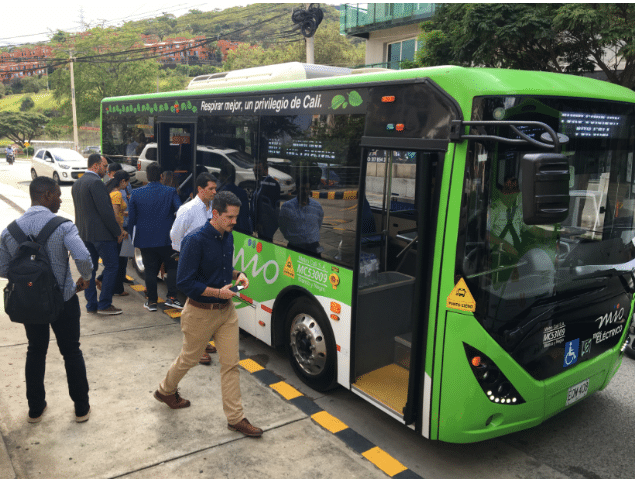
Public transport systems electrification is essential for the Colombian National Government in order to reduce GHG emissions in the transport sector and use energy efficiently. The TRANSfer component in Colombia aims at improving quality of life and reducing GHG emissions through an electric bus promotion programme. To achieve this, there is a need to increase the awareness of local governments and public transport management entities which are the ones in charge of running transport measures in cities.
The Ministry of Transport presented Colombia’s e-mobility strategy and extracts from the National Development Plan
For the first time, this plan allows national cofinancing of up to 70% for clean technologies in massive transport systems. Additionally, the Colombian Government established an increasing quota stating that by 2035 100% of the new busses, that are to be incorporated into public transport systems, need to be electric.
As part of the mitigation initiative, on 24 and 25 February 2020 GIZ offered an E-Bus Workshop in Cali, where more than 70 mobility experts, academics and decision makers from eleven Colombian cities met to analyse appropriate scenarios to accelerate electric vehicle technology in public transport systems. For two days, these representatives disclosed motivations, requirements, challenges and advances in electric mobility.
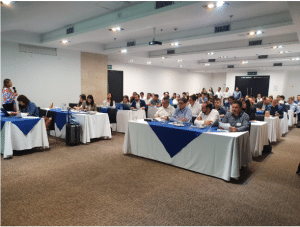
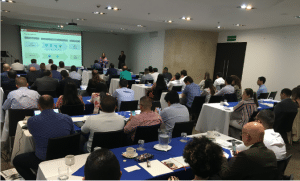
The National E-Mobility Strategy reduces the vehicle tax to 1% for electric vehicles, lowers the fee for the annual obligatory mechanical and technical revision, gives a 10% discount for the Mandatory Transit Insurance and exempts electric vehicles from traffic restrictions such as “Pico y Placa”. These measures show the ambition of the Colombian Government to reduce the emissions from the transport sector, responsible for 12% of the national GHG emissions, and achieve the Nationally Determined Contribution (NDC) target of 20% below the business-as-usual emissions scenario by 2030 and 30% in case of international support.
But which basic principles need to be considered to deploy e-busses?
Fernando Paez from the World Ressources Intstitute (WRI) Mexico explained that electric mobility should be seen from a service quality perspective which demands higher intersectoral coordination to promote and incentivise current e-mobility markets. WRI remarked that
technology maturity as well as e-market performance are essential factors to achieve transformational change and replicability for public transport systems.
As part of the optimisation of electric mobility there should be strategies to promote adequate charging infrastructure, e-vehicles and appropriate batteries based on operational and financial needs.
To see how the operation of e-buses works in practice, the participants visited the operator Blanco y Negro, the first operator in Cali to run this technology. Diego González, director for maintenance, presented evolution and main results for the 26 e-buses that are operating in Cali since September of 2019:
In terms of vehicle technology, the low-platform 10 meters e-buses have 6 batteries each, needing at least 3 charging hours per day per vehicle. The driving range is near to 250 km per day, with 2,6 driver per bus. A reduction in fuel and maintenance costs have been estimated in 66% and 30%, respectively. Electricity costs COP$455/KWh with a performance of 1,3 km/KWh. Diesel costs $8.700/gallon and 9.4 km/gallon, this cost analysis shows a saving of 63% on energy expenses.
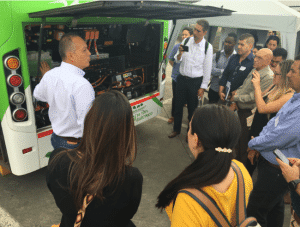
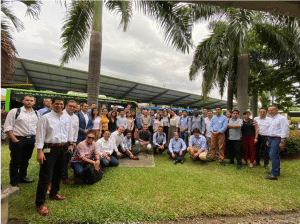
Through the different inputs and discussions held, the workshop was also an appropriate scenario to build capacity at local level around the following topics:
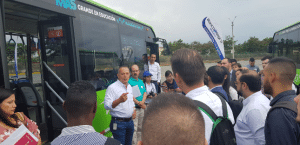
As part of this stakeholder’s exchange, a working group session gave the opportunity to representatives of public transport management entities to better understand strategic planning processes for e-buses operation and to analyse their current needs in terms of political, regulatory, institutional framework, financial incentives, infrastructure, vehicle typology, among other aspects. This exercise was applied to four Colombian cities (Bucaramanga, Villavicencio, Popayán and Pasto) and allowed stakeholders to work on their own analysis and theoretical business models in terms of investment components, sources of economic resources and financial mechanisms.
This workshop as well as other strategies, are part of the capacity building program that the TRANSfer project is developing to obtain better results in terms of e-buses deployment for public transport systems in Colombia.
You need to load content from reCAPTCHA to submit the form. Please note that doing so will share data with third-party providers.
More InformationYou are currently viewing a placeholder content from X. To access the actual content, click the button below. Please note that doing so will share data with third-party providers.
More Information